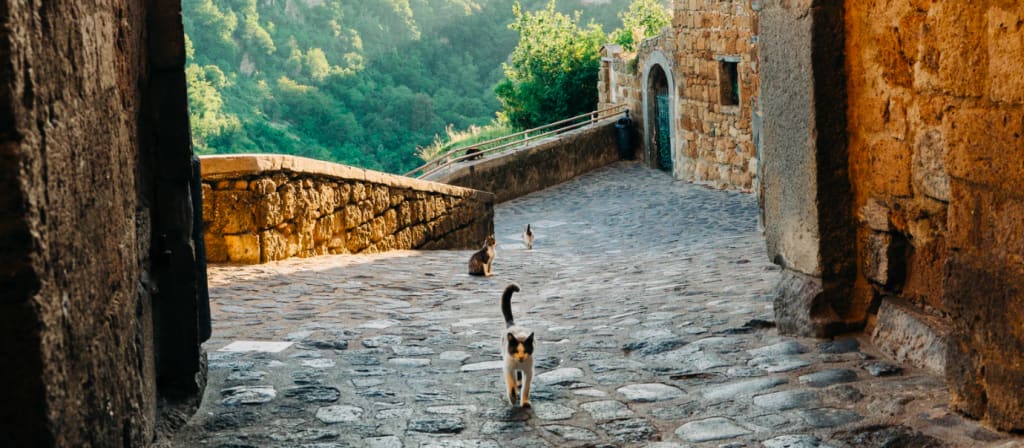The Dreamer
A submission for "The Little Black Book" challenge

In the dry south of Italy, in a small town in Calabria, a small boy with dark curly hair skips along the stone path, painting each stone a different color as his foot touches it. The sidewalk comes alive as he travels down the path to the bakery. The baker leans out of the window, waving vigorously to the boy and he waves back. He gives the baker three euros in exchange for a fresh loaf of bread to bring his family.
“How are you today, Boy?” the baker says through a wide-mouthed smile.
“I’m well, Sir. Today I painted the stones in the path in different colors of the rainbow.”
“Is that so?” replies the baker. “What is the color of that stone?” he says pointing to the one under the boy’s left foot.
“This one is teal, the color of the ocean on a clear day.”
“Very well. And that one?” he says pointing to the one under the boy’s right foot.
“That one is orange, like last night’s sunset.”
“Both fantastic colors,” the baker nods his approval. “I have something special for you today,” he says as he turns his back to the boy, continuing to chatter about his aspirations of opening a series of bakeries across the country. He returns with a small black leather-bound notebook, handing it to the boy.
“For your dreams.”
He thanks the baker and continues painting the stones under his feet as he skips down the path toward home. Under the glow of the lamp, he takes the small black notebook off the shelf and begins to trace his dreams in its pages.
That night, his father finds the boy asleep in his bed, the binding of the notebook creased down the middle. He gently places it on the desk, tucks in his son, and turn off the lamp. Every night for three weeks, his father finds the boy like this and every night, his father performs the same routine.
Again the boy journeys down the cobblestone path to the bakery and the baker asks him to describe the dreams that he now diligently logs in his small black notebook. The boy hands the baker three euros in exchange for bread and continues down the path home.
The boy sees an old man in elegant clothes lying in the grass off the beaten path. The boy is cautious, but an air of calm about the old man inspires him to stop.
“Please son,” the man says as the boy slowly approaches, “Do you have parchment? I am in need of paper to write something down.” The man looks tired and wary. Beads of sweat fall softly from his temple down his cheek and into his cloak.
“Sir, I have a notebook. It makes me sad to consider parting with my favorite possession, but I can see that you are unwell and may need it more than I.” The boy hands the old man the notebook with only two empty pages remaining.
The old man scribbles something on those two remaining pages and looks up.
“Take this to the seamstress's daughter,” the old man says. “I have been sick a long time, and I am dying. Permit me this one last request.”
The boy looks into the old man’s brown eyes and nods, gently taking the notebook. The old man's breath becomes shallow as he closes his eyes. When it finally stops, the boy rushes into the village in search of the seamstress’s daughter. He finds her and hands her his prized possession, the little black notebook. She cries quiet tears reading the passage, which explains that the old man, a prominent businessman from Milan, was her father. The two had been searching for each other for twenty-one years and he had finally found a clue that led him to this village with the hope of reconnecting with her.
The old man wrote his last will and testament on the last page of the notebook. He left his estate to the young woman and, as a token of the man’s appreciation for the boy’s good character, the prominent businessman left him twenty thousand euros.
The boy shakes his head, “I cannot accept this.”
“I did not know the old man who is my father, but he deserves to die with dignity,” she says. “Please accept his gift.”
It’s nearly dusk as the boy travels through the village. At the dinner table, the boy explains how he will give the money to his father to support the family. His father looks at the boy for several seconds and then shakes his head.
“We could use some of the money to repair the roof over your sister’s room, but the rest is yours to spend. The old man gave it to you.”
The boy buys a dozen more leather-bound notebooks in a variety of colors. On his morning excursion, he delivers a red notebook to the baker and a bright blue one to the seamstress's daughter. He gives a brown one to his father and keeps a small black one for his own dreams.
About the Creator
Enjoyed the story? Support the Creator.
Subscribe for free to receive all their stories in your feed. You could also pledge your support or give them a one-off tip, letting them know you appreciate their work.






Comments
There are no comments for this story
Be the first to respond and start the conversation.